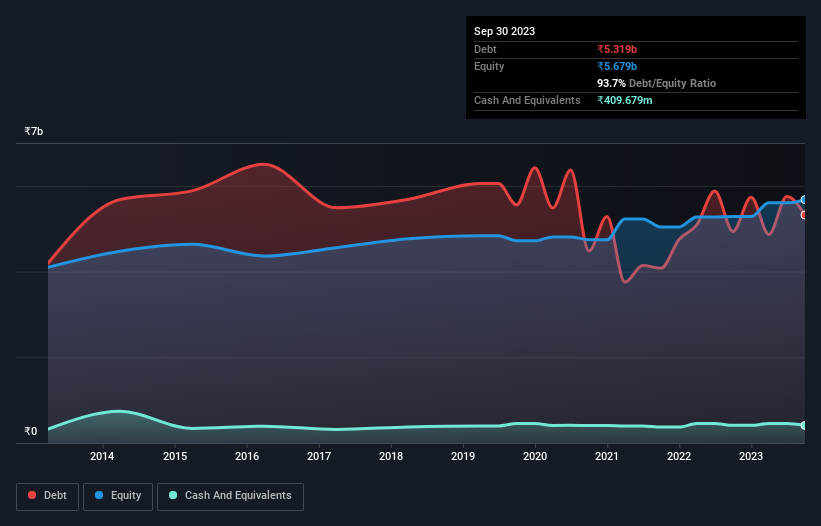Howard Marks put it nicely when he said that, rather than worrying about share price volatility, 'The possibility of permanent loss is the risk I worry about... and every practical investor I know worries about.' So it might be obvious that you need to consider debt, when you think about how risky any given stock is, because too much debt can sink a company. Importantly, Tribhovandas Bhimji Zaveri Limited (NSE:TBZ) does carry debt. But is this debt a concern to shareholders?
When Is Debt A Problem?
Debt assists a business until the business has trouble paying it off, either with new capital or with free cash flow. In the worst case scenario, a company can go bankrupt if it cannot pay its creditors. While that is not too common, we often do see indebted companies permanently diluting shareholders because lenders force them to raise capital at a distressed price. By replacing dilution, though, debt can be an extremely good tool for businesses that need capital to invest in growth at high rates of return. When we think about a company's use of debt, we first look at cash and debt together.
View our latest analysis for Tribhovandas Bhimji Zaveri
What Is Tribhovandas Bhimji Zaveri's Net Debt?
The image below, which you can click on for greater detail, shows that at September 2023 Tribhovandas Bhimji Zaveri had debt of ₹5.32b, up from ₹4.94b in one year. However, it does have ₹409.7m in cash offsetting this, leading to net debt of about ₹4.91b.

How Healthy Is Tribhovandas Bhimji Zaveri's Balance Sheet?
According to the last reported balance sheet, Tribhovandas Bhimji Zaveri had liabilities of ₹7.87b due within 12 months, and liabilities of ₹856.9m due beyond 12 months. Offsetting these obligations, it had cash of ₹409.7m as well as receivables valued at ₹20.8m due within 12 months. So it has liabilities totalling ₹8.29b more than its cash and near-term receivables, combined.
This deficit is considerable relative to its market capitalization of ₹9.13b, so it does suggest shareholders should keep an eye on Tribhovandas Bhimji Zaveri's use of debt. Should its lenders demand that it shore up the balance sheet, shareholders would likely face severe dilution.
We measure a company's debt load relative to its earnings power by looking at its net debt divided by its earnings before interest, tax, depreciation, and amortization (EBITDA) and by calculating how easily its earnings before interest and tax (EBIT) cover its interest expense (interest cover). This way, we consider both the absolute quantum of the debt, as well as the interest rates paid on it.
Tribhovandas Bhimji Zaveri has a debt to EBITDA ratio of 4.1 and its EBIT covered its interest expense 2.6 times. This suggests that while the debt levels are significant, we'd stop short of calling them problematic. Looking on the bright side, Tribhovandas Bhimji Zaveri boosted its EBIT by a silky 52% in the last year. Like a mother's loving embrace of a newborn that sort of growth builds resilience, putting the company in a stronger position to manage its debt. When analysing debt levels, the balance sheet is the obvious place to start. But you can't view debt in total isolation; since Tribhovandas Bhimji Zaveri will need earnings to service that debt. So when considering debt, it's definitely worth looking at the earnings trend. Click here for an interactive snapshot.
Finally, while the tax-man may adore accounting profits, lenders only accept cold hard cash. So the logical step is to look at the proportion of that EBIT that is matched by actual free cash flow. Looking at the most recent three years, Tribhovandas Bhimji Zaveri recorded free cash flow of 48% of its EBIT, which is weaker than we'd expect. That's not great, when it comes to paying down debt.
Our View
Neither Tribhovandas Bhimji Zaveri's ability to cover its interest expense with its EBIT nor its net debt to EBITDA gave us confidence in its ability to take on more debt. But the good news is it seems to be able to grow its EBIT with ease. Looking at all the angles mentioned above, it does seem to us that Tribhovandas Bhimji Zaveri is a somewhat risky investment as a result of its debt. That's not necessarily a bad thing, since leverage can boost returns on equity, but it is something to be aware of. When analysing debt levels, the balance sheet is the obvious place to start. But ultimately, every company can contain risks that exist outside of the balance sheet. For example Tribhovandas Bhimji Zaveri has 2 warning signs (and 1 which doesn't sit too well with us) we think you should know about.
If, after all that, you're more interested in a fast growing company with a rock-solid balance sheet, then check out our list of net cash growth stocks without delay.
Valuation is complex, but we're here to simplify it.
Discover if Tribhovandas Bhimji Zaveri might be undervalued or overvalued with our detailed analysis, featuring fair value estimates, potential risks, dividends, insider trades, and its financial condition.
Access Free AnalysisHave feedback on this article? Concerned about the content? Get in touch with us directly. Alternatively, email editorial-team (at) simplywallst.com.
This article by Simply Wall St is general in nature. We provide commentary based on historical data and analyst forecasts only using an unbiased methodology and our articles are not intended to be financial advice. It does not constitute a recommendation to buy or sell any stock, and does not take account of your objectives, or your financial situation. We aim to bring you long-term focused analysis driven by fundamental data. Note that our analysis may not factor in the latest price-sensitive company announcements or qualitative material. Simply Wall St has no position in any stocks mentioned.
About NSEI:TBZ
Tribhovandas Bhimji Zaveri
Designs, manufactures, retails, and sells jewelry primarily in India.
Proven track record with mediocre balance sheet.
Similar Companies
Market Insights
Community Narratives



